Terminal (Ellie Jordan, Ghost Trapper Book 4) Read online
Contents
Title Page
Copyright
Acknowledgments
Also by J. L. Bryan
Dedication
Chapter One
Chapter Two
Chapter Three
Chapter Four
Chapter Five
Chapter Six
Chapter Seven
Chapter Eight
Chapter Nine
Chapter Ten
Chapter Eleven
Chapter Twelve
Chapter Thirteen
Chapter Fourteen
Chapter Fifteen
Chapter Sixteen
Chapter Seventeen
Chapter Eighteen
Chapter Nineteen
Chapter Twenty
Chapter Twenty-One
Chapter Twenty-Two
Chapter Twenty-Three
Chapter Twenty-Four
Chapter Twenty-Five
Chapter Twenty-Six
Chapter Twenty-Seven
Chapter Twenty-Eight
From the author
Terminal
Ellie Jordan, Ghost Trapper,
Book Four
by J.L. Bryan
Copyright 2015 J.L. Bryan
All rights reserved.
This book or any portion thereof may not be reproduced or used in any manner whatsoever without the express written permission of the publisher except for the use of brief quotations in a book review.
All characters appearing in this work are fictitious. Any resemblance to real persons, living or dead, is purely coincidental.
Acknowledgments
I appreciate everyone who has helped with this book. My beta readers include authors Daniel Arenson and Robert Duperre (check out their books!). Proofing is done by Thelia Kelly. The cover is by PhatPuppy Art.
Most of all, I appreciate the book bloggers and readers who keep coming back for more! The book bloggers who’ve supported me over the years include Danny, Heather, and Heather from Bewitched Bookworks; Mandy from I Read Indie; Michelle from Much Loved Books; Shirley from Creative Deeds; Katie and Krisha from Inkk Reviews; Lori from Contagious Reads; Heather from Buried in Books; Kristina from Ladybug Storytime; Chandra from Unabridged Bookshelf; Kelly from Reading the Paranormal; AimeeKay from Reviews from My First Reads Shelf and Melissa from Books and Things; Kristin from Blood, Sweat, and Books; Aeicha from Word Spelunking; Lauren from Lose Time Reading; Kat from Aussie Zombie; Andra from Unabridged Andralyn; Jennifer from A Tale of Many Reviews; Giselle from Xpresso Reads; Ash from Smash Attack Reads; Ashley from Bookish Brunette; Loretta from Between the Pages; Ashley from Bibliophile’s Corner; Lili from Lili Lost in a Book; Line from Moonstar’s Fantasy World; Lindsay from The Violet Hour; Rebecca from Bending the Spine; Holly from Geek Glitter; Louise from Nerdette Reviews; Isalys from Book Soulmates; Jennifer from The Feminist Fairy; Heidi from Rainy Day Ramblings; Kristilyn from Reading in Winter; Kelsey from Kelsey’s Cluttered Bookshelf; Lizzy from Lizzy’s Dark Fiction; Shanon from Escaping with Fiction; Savannah from Books with Bite; Tara from Basically Books; Toni from My Book Addiction; Abbi from Book Obsession; Laura from FUONLYKNEW; Lake from Lake’s Reads; Jenny from Jenny on the Book; and anyone else I missed!
Also by J.L. Bryan:
The Ellie Jordan series (urban fantasy)
Ellie Jordan, Ghost Trapper
Cold Shadows
The Crawling Darkness
Terminal
(The fifth Ellie Jordan book will be available by fall 2015)
The Jenny Pox series (supernatural/horror)
Jenny Pox
Tommy Nightmare
Alexander Death
Jenny Plague-Bringer
Urban Fantasy/Horror
Inferno Park
The Unseen
Science Fiction Novels
Nomad
Helix
The Songs of Magic Series (YA/Fantasy)
Fairy Metal Thunder
Fairy Blues
Fairystruck
Fairyland
Fairyvision
For Johnny
Chapter One
“So explain to me about the three types of banshees,” Stacey said over my headset.
I was down in our new clients’ basement, exploring with my Mel-Meter while Stacey sat in the van, watching our array of thermal and night vision cameras over the monitors. It was about two-thirty in the morning, and all was quiet for the moment, though Stacey had picked up some cold spots in the basement earlier that night.
“Three basic types, but they may all be different evolutionary stages of the same kind of ghost.” I kept my voice low as I explored the shadowy rooms. The basement was unfinished, lots of bare studs and concrete, empty except for a heap of U-Haul boxes in one corner. Our clients hadn’t lived here long. The basement was mostly aboveground, sharing the bottom level of the house with the garage.
“Okay,” Stacey said. “First there’s just a sad ghost, right?”
“A ghost whose primary emotional tone is grief,” I whispered. “Usually encountered as an auditory apparition. Weeping, sobbing, moaning, screaming...”
“Like what the Kozlows were talking about.” Stacey was referring to our clients, a married couple in their late twenties. The wife, Ember, was expecting their first baby within the month. She and her husband had both heard a female voice weeping softly in their house, always late at night, usually down in the basement. They’d never been able to find the source of it.
“We’d call that a first-stage banshee,” I said. “A ghost with uncontrollable grieving issues. Often suicides, or people who suffered deep emotional pain in life. They won’t let go of their pain, and it ties them to this world.”
“Then the second type is the really dangerous kind?”
“In a sense.” I walked to the basement door and looked out through its glass panes. The Kozlows’ back yard was like something from a home and garden catalog, a lush carpet of vibrant grass dotted with hopeful young magnolia and peach trees. A stone birdbath stood near the center, and an actual white picket fence enclosed the yard.
Beyond the back fence, I could see the next street in the neighborhood—a couple of skeletal, half-built houses and many acres of raw red earth, the area looking as dead as a Martian landscape under the moonlight.
“The second type of banshee has learned to feed on the grief of the living,” I said. “That’s when they become real problems. That’s the banshee you usually hear about in legends. It becomes a fully visible apparition, so solid it can be mistaken for a living person. People say when you see them it’s a warning that you or one of your family members is about to die.”
“But that’s not true?” Stacey asked.
“The banshee doesn’t show up just to be a pal and let you know about impending doom.” I checked and adjusted the night vision camera in one of the unfinished basement rooms, walled only with bare wooden studs that made me feel as if I stood in a cage. “It shows up at the scene of an approaching death for the same reason vultures and crows gather around a dying animal. The household is about to be flooded with grief, and then it’s feeding time for the banshee.”
“But how do they know the future?”
“I’m not sure, but that’s what draws them, like sharks to blood.” I sat down on one of the unpainted wooden steps that led up to the kitchen on the first floor.
“They say my great-grandmother’s yard was full of vultures the day before she died,” Stacey said. “They hardly ever showed up on the farm before or since.”
“Certain animals have a sixth sense about death, too,” I said.
“So what happens when a
banshee feeds on you?”
“Prolonged grief, incurable depression, eventually suicidal urges,” I said. “It’s like a dark emotional cloud that never leaves your mind.”
“Sounds about as pleasant as an alien face parasite. And what’s the third type?”
“The one who’s figured out how to cut out the middleman. Instead of sniffing around, trying to find grief, it goes ahead and creates it. It will kill you with its own hands to sow grief and misery in your household. It might look like a household accident, a heart attack, or a sudden illness. Ghosts don’t exactly leave fingerprints or DNA samples all over their crime scenes.”
“So how many people do you think ghosts kill every year?”
“No way to tell,” I said. “One favorite method, like you said, is pushing people down stairs. Falling down is the second-largest cause of accidental death after car crashes. Half a million people a year around the world die from falls.”
“So there could be tons of murderous ghosts out there,” Stacey said.
“It’s possible.” I turned on the high-sensitivity portable microphone I’d brought. “I guess we’ll try the EVP approach. If this is just a first-stage banshee, we might be able to convince her to move on.”
“You’re the boss, boss.”
“Are you recording?”
“Receiving and recording, yep.”
I took a couple of deep breaths as I began to walk through the basement again. Working in Savannah, I usually found myself in moldering old mansions thick with layers of history and tragedy, but this house was only four years old and had only been occupied for a few months. Much of the neighborhood hadn’t even been built yet.
The neighborhood was actually a planned community called Town Village, with a dozen streets converging like the spokes of a wagon wheel onto the park at the center. On the developer’s website, an artist’s representation showed a golf course, tennis courts, and a large, grassy park with a baseball diamond, playground, and swimming pool.
In person, I’d noticed that the “park” was actually a wilderness of churned earth, weeds, and dense scrub pines a little taller than me. It was supposedly still under construction, but according to our clients, there had been no signs of new construction in the neighborhood since they’d moved into the house four months earlier.
“Hello? Is someone down here?” I asked, holding out my microphone like an intrepid reporter interviewing an invisible witness. “My name is Ellie Jordan. I’m here to help you.” Unless you threaten my clients, I thought. “Can you tell me your name?”
I walked through the gloomy basement. The lights were off, but there was some illumination from the back porch light seeping in through the basement door.
“People say they hear you crying,” I said. “Why are you sad? Can you tell my why you’re here?”
I didn’t hear anything, but later we’d review the audio captured by the microphone. It was surprising what could turn up.
I continued around the basement, asking the same basic questions. Who are you? What do you want?
“Ellie,” Stacey whispered over my headset. “Under the stairs.”
I looked into the shadowy area beneath the unpainted wooden stairs. I could feel a cold spot, and my Mel Meter confirmed that the temperature was nine degrees colder than the rest of the basement, with a noticeable rise in electromagnetic energy.
“Are you there?” I whispered.
A voice responded, or at least a thin echo of a voice. The sound was almost too quiet to hear, but I thought it might be a girl sobbing.
I pulled my thermal goggles down over my eyes.
She was hard to discern, a cluster of pale greenish-blue shapes that, taken together, seemed to suggest the figure of a small girl sitting under the lowest steps, her knees drawn up to her chin.
“I can see you there.” I spoke as softly and gently as I could. “Do you need help?”
A moaning sound rose around me, like a low wind. Then the crying really began.
“I can hear you,” I said. “I can see you. What do you want to talk about?”
She cried louder, the sound interrupted by hitching sobs, as if I were just upsetting her more. I knew it could grow even louder than that. My clients had heard the crying all the way up in their bedroom, two stories above the basement.
“Can you tell me where you’re crying?” I asked again.
Crying turned to wailing, so loud my ears began to ache.
“Don’t be afraid.” I squatted near the space occupied by the ghost. She sounded so full of pain and sorrow. My heart went out to her. I wondered what could have inflicted such grief on someone so young, and how she had died.
“Ellie, behind you!” Stacey barked over my headset, making me jump.
I felt it before I even turned around—a deep freeze washing over me, as though someone had just opened a door and stepped into the basement from deep in the icy steppes of Siberia, bringing a severe wind with them.
Something else was in the room, watching me, and it felt powerful. My Mel Meter went crazy with the dropping temperature and surging energy.
My heart was already thumping much too fast as I turned around, drawing the three-thousand-lumen tactical flashlight from my belt. What I saw through my thermal goggles almost bumped it up to an actual heart attack.
The shape was enormous, a purple-black cloudy mass swelling toward me from the door to the back yard, sucking all the heat from the room. It looked like a storm cloud moving just above the ground.
I planted my feet, ready to click on my flashlight, but it distended around me. It was moving toward the girl-ghost, who’d gone silent under the stairs. As it approached her, she began sobbing again, then screamed so loud my ears rang.
It looked like the big dark mass was here to collect the girl ghost, not to bother me.
Maybe I should have just backed off. My clients were paying me to get the weeping girl out of their house, and this other entity might be doing my job for me. There was no telling where it would take her or what it would do to her, but the easiest and safest thing would be to sit back and do nothing.
I couldn’t, though. I couldn’t stand by while the larger entity dragged her away screaming.
“Stop!” I shouted, blasting my flashlight toward the cold mass. It stopped its approach and contracted a bit. Through my thermals, I could see the bright beam of my light slicing past the purple layers of cold, right to the black heart of the entity.
“Ellie, do you need me?” Stacey asked over my headset.
“Wait there.”
The dark cloud shifted, refocusing its energy toward me. Tension swelled in the freezing air, and I felt it was about to attack.
I blasted Vivaldi’s Juditha triumphans over the speaker on my belt, a powerful and upbeat oratorio about an Israelite woman who killed an Assyrian king to protect her city, accompanied by trumpets and drum.
“Leave this house!” I shouted at the big, dark entity, hoping to sound threatening. “On behalf of all that live here, I command you to leave.”
The darkness contracted more, taking the general shape of a man but solid black with cold. He appeared eight feet tall, like he wanted to be intimidating.
“Go!” I stepped closer, expanding the iris of my flashlight to try and engulf the dark figure.
The entity hesitated a moment, then barreled away from me, passing out through the door like a mass of steam.
I pursued. I wanted to see where it went in case we needed to track it later.
Since I wasn’t a ghost, I had to pause to unlock and open the basement door. By the time I emerged, it was already across the lawn, passing through the slats of the picket fence like a patch of fog accelerated by swift wind.
I ran after it, turning down the volume on my music and keeping my flashlight pointed at the ground. Now that it was on the move, I didn’t want it to chase it away too quickly. I was already having trouble keeping up.
The picket fence was not my friend. By the time I r
eached it, the dark fog was halfway across the raw red earth of the empty lot behind my clients’ home. I had to clamber over the flimsy lightweight fence, which shuddered like it would collapse beneath me. I jumped to the earth, landing with the grace of a drunken hippopotamus.
I stumbled, regained my balance, and looked up.
The dark entity had resumed the shape of a man. It stood on the road ahead. There were a couple of half-built houses on that street, but most of the lots were completely empty, inhabited only by dirt and weeds. The street itself had been paved and completely built out with curbs, storm drains, sidewalks, fire hydrants, and unlit iron-post street lamps, all the amenities ready to support the houses that had never been erected.
The man-shape was not moving. It appeared to be facing me, watching and waiting.
I approached slowly, feeling a little more frightened with every step. It wasn’t moving at all, like a predator lying in wait for its prey to foolishly approach.
“Ellie, I can’t see you,” Stacey said. “What are you doing out there?”
“Sh.” I took a risk and lifted the thermal goggles off my face, wondering if I could see the ghost with my own eyes. The thermal images showed me where it was and how cold it was, but would never give me any real identifying details.
I blinked while my eyes adjusted.
Then I saw it.
The figure was still dark and shadowy, though no longer supernaturally large. I had the impression of a man in a brimmed hat and heavy coat, but nothing clear enough to give me a hint of the clothing’s era. It could have been anything from a bowler hat and overcoat from the nineteenth century to a trenchcoat and fedora from the early twentieth. A pale cloth concealed his face, so he looked almost like a sheet ghost with a hat and a coat.
“Who are you?” I asked him.
He reached a hand toward his hat brim, as though he intended to tip his hat in the old-fashioned manner.
Then he vanished.
I checked through my thermals again, but there was nothing to see. The thing had hit the road without a trace.

 Ghost Trapper 12 The Necromancer's Library
Ghost Trapper 12 The Necromancer's Library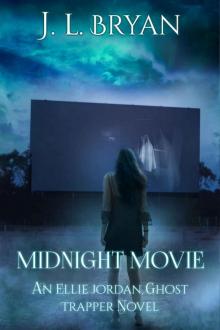 Ghost Trapper 14 Midnight Movie
Ghost Trapper 14 Midnight Movie_preview.jpg) Fairy Metal Thunder (Songs of Magic, Book 1)
Fairy Metal Thunder (Songs of Magic, Book 1)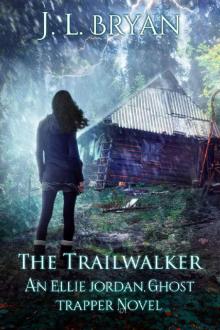 Ghost Trapper 13 The Trailwalker
Ghost Trapper 13 The Trailwalker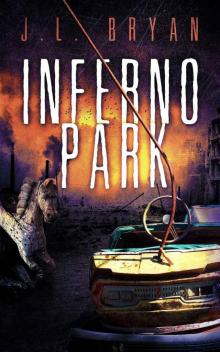 Inferno Park
Inferno Park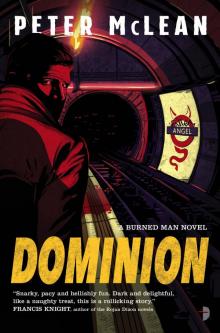 Dominion
Dominion Nomad
Nomad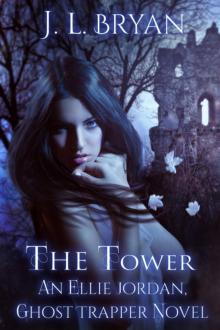 The Tower (Ellie Jordan, Ghost Trapper Book 9)
The Tower (Ellie Jordan, Ghost Trapper Book 9) Jenny Pox (The Paranormals, Book 1)
Jenny Pox (The Paranormals, Book 1)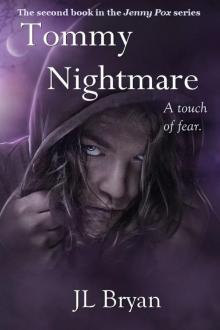 Tommy Nightmare (Jenny Pox #2)
Tommy Nightmare (Jenny Pox #2)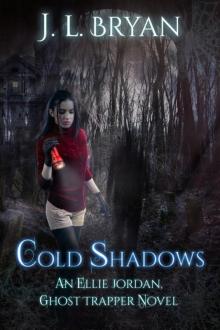 Cold Shadows (Ellie Jordan, Ghost Trapper Book 2)
Cold Shadows (Ellie Jordan, Ghost Trapper Book 2) Alexander Death (The Paranormals, Book 3)
Alexander Death (The Paranormals, Book 3)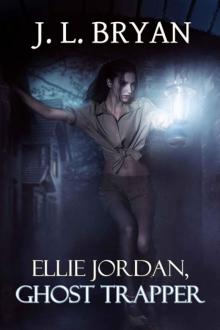 Ellie Jordan, Ghost Trapper
Ellie Jordan, Ghost Trapper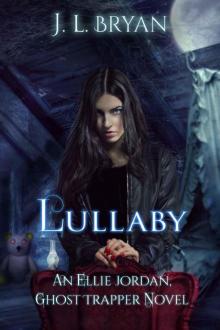 Lullaby (Ellie Jordan, Ghost Trapper Book 7)
Lullaby (Ellie Jordan, Ghost Trapper Book 7)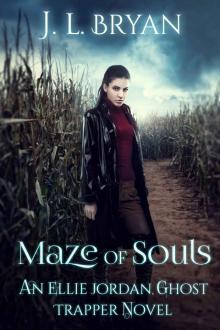 EJ06 - Maze of Souls
EJ06 - Maze of Souls Fairy Metal Thunder (Songs of Magic, #1)
Fairy Metal Thunder (Songs of Magic, #1)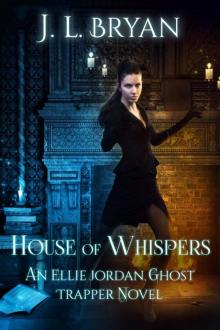 House of Whispers (Ellie Jordan, Ghost Trapper Book 5)
House of Whispers (Ellie Jordan, Ghost Trapper Book 5) Terminal (Ellie Jordan, Ghost Trapper Book 4)
Terminal (Ellie Jordan, Ghost Trapper Book 4) Jenny Pox
Jenny Pox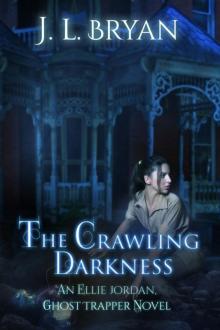 The Crawling Darkness (Ellie Jordan, Ghost Trapper Book 3)
The Crawling Darkness (Ellie Jordan, Ghost Trapper Book 3)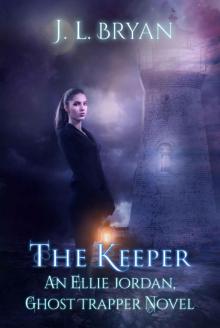 The Keeper (Ellie Jordan, Ghost Trapper Book 8)
The Keeper (Ellie Jordan, Ghost Trapper Book 8)